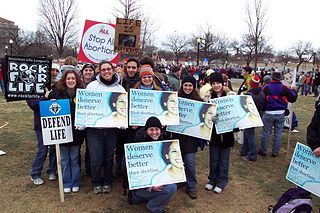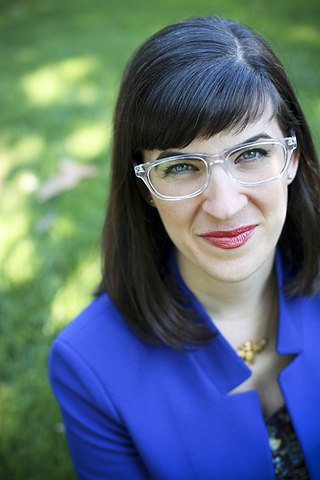Related Research Articles
Roe v. Wade, 410 U.S. 113 (1973), was a landmark decision of the U.S. Supreme Court in which the Court ruled that the Constitution of the United States generally protected a right to have an abortion. The decision struck down many abortion laws, and caused an ongoing abortion debate in the United States about whether, or to what extent, abortion should be legal, who should decide the legality of abortion, and what the role of moral and religious views in the political sphere should be. The decision also shaped debate concerning which methods the Supreme Court should use in constitutional adjudication.

Norma Leah Nelson McCorvey, also known by the pseudonym "Jane Roe", was the plaintiff in the landmark American legal case Roe v. Wade in which the U.S. Supreme Court ruled in 1973 that individual state laws banning abortion were unconstitutional.

The United States is a global outlier among developed countries on the issue of abortion, with the subject being divisible in American politics and culture wars to an extent not found elsewhere. There are widely different abortion laws depending on state.
Radical Women (RW) is a socialist feminist grassroots activist organization affiliated with the Freedom Socialist Party. It has branches in Seattle, Washington, and Melbourne, Australia.

Sarah Catherine Ragle Weddington was an American attorney, law professor, advocate for women's rights and reproductive health, and member of the Texas House of Representatives. She was best known for representing "Jane Roe" in the landmark Roe v. Wade case before the United States Supreme Court. She also was the first woman General Counsel for the US Department of Agriculture.

Feminists for Life of America (FFL) is a non-profit, anti-abortion feminist, non-governmental organization (NGO). Established in 1972, and now based in Alexandria, Virginia, the organization publishes a biannual magazine, The American Feminist, and aims to reach young women, college students in particular.
Doe v. Bolton, 410 U.S. 179 (1973), was a decision of the Supreme Court of the United States overturning the abortion law of Georgia. The Supreme Court's decision was released on January 22, 1973, the same day as the decision in the better-known case of Roe v. Wade.
Rosemary Dempsey a noted American Activist, has served many roles in second wave feminism, civil rights movements, and anti-war protests. Her most notable positions were Vice President for Action of The National Organization of Women (NOW) starting in 1990 and Director for the Center for Reproductive Law and Policy.

The United States anti-abortion movement contains elements opposing induced abortion on both moral and religious grounds and supports its legal prohibition or restriction. Advocates generally argue that human life begins at conception and that the human zygote, embryo or fetus is a person and therefore has a right to life. The anti-abortion movement includes a variety of organizations, with no single centralized decision-making body. There are diverse arguments and rationales for the anti-abortion stance. Some anti-abortion activists allow for some permissible abortions, including therapeutic abortions, in exceptional circumstances such as incest, rape, severe fetal defects, or when the woman's health is at risk.

Catholics for Choice (CFC) is a dissenting Catholic group that advocates for abortion rights which is based in Washington, D.C. Formed in 1973 as Catholics for a Free Choice, the group gained notice after its 1984 advertisement in The New York Times challenging Church teaching on abortion led to Church disciplinary pressure against some of the priests and nuns who signed it. It has lobbied nationally and internationally for abortion rights goals and led an unsuccessful effort to downgrade the Holy See's status in the United Nations. CFC was led for 25 years by Frances Kissling and is currently led by its President Jamie L. Manson.
The Women's Health and Human Life Protection Act was a state law passed by the South Dakota State Legislature in early 2006. It emerged as an effort to overturn Roe v. Wade via enacting a ban on abortion in the state of South Dakota. The law was repealed by voter referendum on November 7, 2006.

Cecile Richards is an American activist who served as the president of the Planned Parenthood Federation of America and president of the Planned Parenthood Action Fund from 2006 to 2018. In 2010, Richards was elected to the Ford Foundation board of trustees. In spring 2019, Richards co-founded Supermajority, a women's political action group.
Dubay v. Wells, or the Matt Dubay child support case, was an American legal case in 2006 between Matt Dubay and his ex-girlfriend Lauren Wells, both of Saginaw Township, Michigan. The case was dubbed "Roe v. Wade for Men" by the National Center for Men. The case concerned whether the Michigan Paternity Act violates the United States Constitution's Equal Protection Clause, in that the Act allegedly applies to men but not to women.

The National Organization for Women (NOW) is an American feminist organization. Founded in 1966, it is legally a 501(c)(4) social welfare organization. The organization consists of 550 chapters in all 50 U.S. states and in Washington, D.C. It is the largest feminist organization in the United States with around 500,000 members. NOW is regarded as one of the main liberal feminist organizations in the US, and primarily lobbies for gender equality within the existing political system. NOW campaigns for constitutional equality, economic justice, reproductive rights, LGBTQIA+ rights and racial justice, and against violence against women.

Ann Landers was a pen name created by Chicago Sun-Times advice columnist Ruth Crowley in 1943 and taken over by Esther Pauline "Eppie" Lederer in 1955. For 56 years, the Ask Ann Landers syndicated advice column was a regular feature in many newspapers across North America. Owing to this popularity, "Ann Landers", though fictional, became something of a national institution and cultural icon.
The National Coalition of American Nuns (NCAN) was founded in 1969 by Margaret Traxler and Audrey Kopp. The organization is known for its advocacy for women's rights, support for the Equal Rights Amendment, opposition to the Catholic Church hierarchy, including Pope Francis, as well as its positions on abortion, LGBT rights, and women's ordination.

Kathleen Marie Kelly is an American activist, human rights lawyer, and Mormon feminist who founded Ordain Women, an organization advocating for the ordination of women to the priesthood in the Church of Jesus Christ of Latter-day Saints. Kelly was excommunicated from the church in 2014. She is also a nationally known advocate for ratification of the Equal Rights Amendment (ERA) and abortion access.
Abortion in Washington is legal up to the point of fetal viability. 60% of adults said in a poll by the Pew Research Center that abortion should be legal in all or most cases.
Dobbs v. Jackson Women's Health Organization, No. 19-1392, 597 U.S. ___ (2022), is a landmark decision of the U.S. Supreme Court in which the court held that the Constitution of the United States does not confer a right to abortion. The court's decision overruled both Roe v. Wade (1973) and Planned Parenthood v. Casey (1992), returning to individual states the power to regulate any aspect of abortion not protected by federal law.
Adele Ferguson was an American journalist for the Bremerton Sun. She was the first woman to work as a full-time reporter at the Washington State Legislature in Olympia, Washington, a position she held for 32 years.